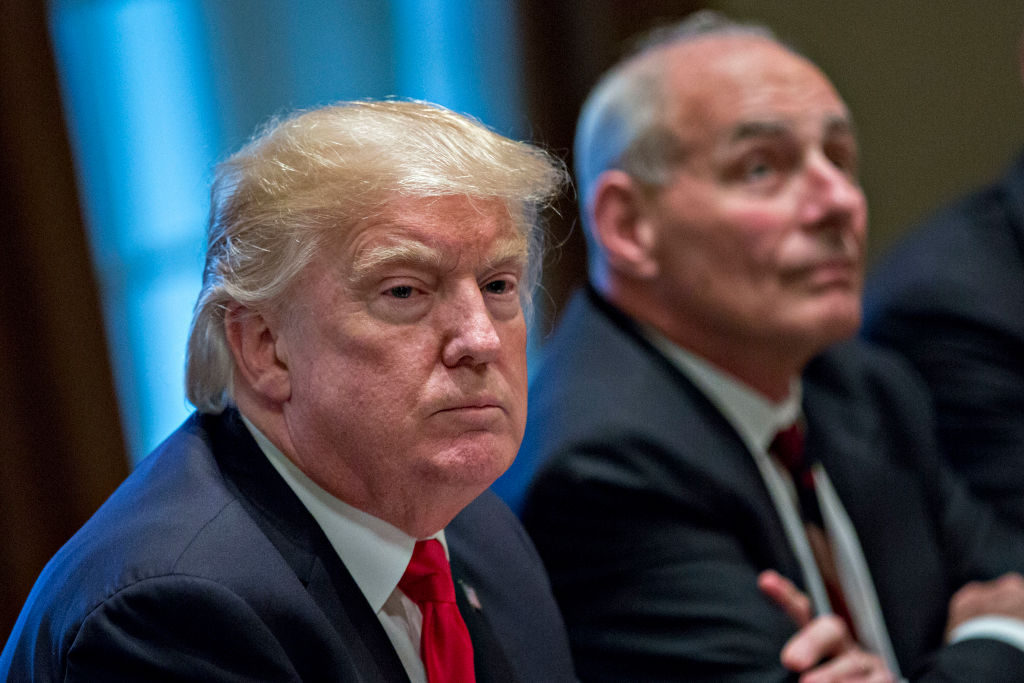The CBO predicts Trump's move to end ObamaCare subsidies will hike premiums, uninsured rate, deficits


A free daily email with the biggest news stories of the day – and the best features from TheWeek.com
You are now subscribed
Your newsletter sign-up was successful
On Thursday night, the Trump administration formally decided to end cost-sharing subsidies that the Health and Human Services Department has been paying insurers to lower premiums for millions of lower-income customers purchasing insurance through the Affordable Care Act exchanges. House Speaker Paul Ryan (R-Wis.) praised the move as an affirmation that "the power of the purse belongs to Congress, not the executive branch" — House Republicans had sued to stop the payments, and the White House had been appealing a court ruling agreeing the subsidies were illegal.
Other lawmakers from both parties, aides to President Trump, HHS officials, and medical and insurance groups had urged Trump to continue authorizing the subsidies, so as not to sabotage the health-insurance markets and cause premiums to soar.
In August, the Congressional Budget Office reached that same conclusion. In order for customers to qualify for cost-sharing reductions (CSRs), they have to sign up for "silver" plans, and the CBO projected that "gross premiums (that is, before premium tax credits are accounted for) for silver plans offered through the marketplaces would, on average, rise by about 20 percent in 2018 relative to the amount in CBO's March 2016 baseline and rise slightly more in later years." The number of uninsured would rise by about 1 million in 2018, though it would drop again as people purchased lower-cost plans, and because customers would be shielded from the premium hikes by larger federal subsidies, the federal deficit would rise by $194 billion over the next 10 years.
The Week
Escape your echo chamber. Get the facts behind the news, plus analysis from multiple perspectives.

Sign up for The Week's Free Newsletters
From our morning news briefing to a weekly Good News Newsletter, get the best of The Week delivered directly to your inbox.
From our morning news briefing to a weekly Good News Newsletter, get the best of The Week delivered directly to your inbox.
Earlier Thursday, Trump signed an executive order aimed at expanding lower-cost, sparser-coverage insurance options, and "until the White House's announcement late Thursday, the executive order represented Trump's biggest step to date to reverse the health-care policies of the Obama administration," The Washington Post says. You can read the entire CBO analysis here.
A free daily email with the biggest news stories of the day – and the best features from TheWeek.com
Peter has worked as a news and culture writer and editor at The Week since the site's launch in 2008. He covers politics, world affairs, religion and cultural currents. His journalism career began as a copy editor at a financial newswire and has included editorial positions at The New York Times Magazine, Facts on File, and Oregon State University.
-
 Political cartoons for February 18
Political cartoons for February 18Cartoons Wednesday’s political cartoons include the DOW, human replacement, and more
-
 The best music tours to book in 2026
The best music tours to book in 2026The Week Recommends Must-see live shows to catch this year from Lily Allen to Florence + The Machine
-
 Gisèle Pelicot’s ‘extraordinarily courageous’ memoir is a ‘compelling’ read
Gisèle Pelicot’s ‘extraordinarily courageous’ memoir is a ‘compelling’ readIn the Spotlight A Hymn to Life is a ‘riveting’ account of Pelicot’s ordeal and a ‘rousing feminist manifesto’
-
 TikTok secures deal to remain in US
TikTok secures deal to remain in USSpeed Read ByteDance will form a US version of the popular video-sharing platform
-
 Unemployment rate ticks up amid fall job losses
Unemployment rate ticks up amid fall job lossesSpeed Read Data released by the Commerce Department indicates ‘one of the weakest American labor markets in years’
-
 US mints final penny after 232-year run
US mints final penny after 232-year runSpeed Read Production of the one-cent coin has ended
-
 Warner Bros. explores sale amid Paramount bids
Warner Bros. explores sale amid Paramount bidsSpeed Read The media giant, home to HBO and DC Studios, has received interest from multiple buying parties
-
 Gold tops $4K per ounce, signaling financial unease
Gold tops $4K per ounce, signaling financial uneaseSpeed Read Investors are worried about President Donald Trump’s trade war
-
 Electronic Arts to go private in record $55B deal
Electronic Arts to go private in record $55B dealspeed read The video game giant is behind ‘The Sims’ and ‘Madden NFL’
-
 New York court tosses Trump's $500M fraud fine
New York court tosses Trump's $500M fraud fineSpeed Read A divided appeals court threw out a hefty penalty against President Trump for fraudulently inflating his wealth
-
 Trump said to seek government stake in Intel
Trump said to seek government stake in IntelSpeed Read The president and Intel CEO Lip-Bu Tan reportedly discussed the proposal at a recent meeting
